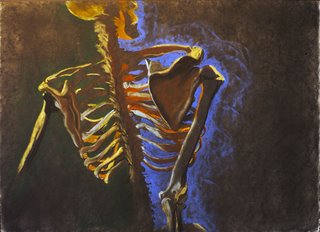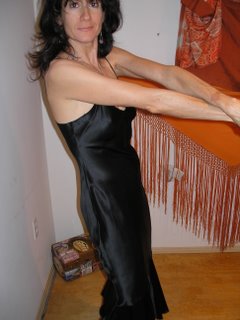Phantasmagoria

10.05.06
Picked up Joan Didion's The White Album from the Y book exchange today and was struck by her first paragraph:
" We tell ourselves stories in order to live. The princess is caged in teh consulate. The man with the candy will lead the children into the sea. The naked woman on the ledge outside the window on the sixteenth floor is a victim of accidie, or the naked woman is an exhibitionisht, and it would be 'interesting' to know which. We tell ourselves that it makes some difference whether the naked woman is about to commit a mortal sin or is about to register a political protest or is about to be, the Aristophanic view, snatched back to the human conidtion by the fireman in priest's clothing just visible in the window behind her, the one smiling at the telephoto lens. We look for the sermon in the suicide, for the social or moral lesson in the murder of five. We interpret what we see, select teh most workable of the multiple choices. We live entirely, especially if we are writers, by the imposition of a narrative line upon disparate images, by the 'ideas' with which we have learned to freeze the shifting phantasmagoria which is our actual experience."
She later talks about being a screenwriter and working with editors who can tell different stories with the same pictures, just putting them together differently. I can't wait to finish the book.
As I look at the world around me and the world I create for myself, the realities I choose to entertain and those I wish to reject, I am reminded of another book by Irvin Yalom, When Nietzche Wept. There's a passage in it about Freud, fictionalized but entirely believeable, in which he looks at his wife, Martha, and experiences a sudden shift in perspective. Rather than seeing the dull, help mate, mother of his children who inspires no passion, he is able in this particular moment to see the woman he feel in love with and can suddenly see her world through her eyes and empathize. This shift saves his marriage in that he no longer feels compelled to act out his sensual desires with a young patient. Martha had not changed into a siren of some sort, nor had Freud quelled his lust; he just switched lenses through which to see his wife. And their relationship became more of what he was looking for.
So much of what i read about achieving mental health includes this ability to take a different look at one's life and entertain a different story line. Rather than see oneself as, say, a victim of one's cruel boss, one could look at same and see an insecure person with a need to dominate and control because of some abuse he/she had received at one point. By looking at the boss as a whole person and oneself as complicit in being "bossed around" one could shift in one's approach to work, the supervisor and in so doing, change the dynamic. I was amazed myself the day in which I looked at my ex-director and sympathized with her problems (which were of no interest to me) and stopped approaching her as the enemy. Suddenly she knew my name and came to me for advice (most of which she never followed but at least she listened) and the reast of my employment time was spent working with, rather than against her. My change in perspective brought about a new relatsionship.
We writers, story tellers, therapists, preachers are all concerned wtih getting to people's inner truths and once they have been laid out on the sand for inspection, devising the editing tools with which to perhaps re-contstruct our stories in a more genuine way. As I listen to the stories of my work clients and get to know them, learn more about why they have doubled, tripled in size, I see so much pain and fear and anger that has been stuffed down by food. It occured to me in a class ht eother day that when we cry, laugh, yell or let OUT emotions, it's very hard to put something IN to your mouth. Storytelling, sharing one's history gets these things out, and supposedly, if we do it enough, if we dump all this emoional, psychological and spiritual trash with enough regularity we can get to the bones of who we are. We can find our frame of reference, our skeletal truth and perhaps then, drape it in raiments worthy of the kings and queens we all yearn to be. Nadine Goldsmith's book "Writing Down the Bones" is next on my reading list. Suddenly the skeletons in the closet don't seem so frightening anymore.


0 Comments:
Post a Comment
<< Home